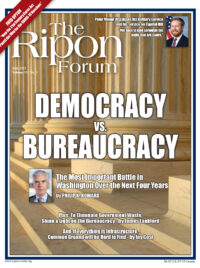
Since the 1960s, the main political dividing line in the United States has been over the scope of government. Democrats have called for more public services and more regulation to address current challenges. Republicans have called for de-regulation and fewer services, backed by ample evidence of public failures, inefficiencies, and overreach. But government keeps getting bigger and generally more inefficient, without dealing with past and present needs.
The public’s frustration with government has also grown. In the early 1960s, 75% of Americans trusted government to generally do the right thing. Today, less than 25% trust government. Indeed, every successful presidential candidate since Jimmy Carter has plucked the chord of voter discontent and promised to fix government.
“Change we can believe in.”
“Drain the swamp.”
But nothing much changes.
How do we square this circle? Why isn’t democracy responsive to voter demands?
Democracy isn’t working because bureaucracy is in charge, not the leaders elected by voters. Government is like a runaway train, beyond democratic control. The steady accretion of regulatory dictates — at this point, 150 million words of federal law and regulation — has preempted human leadership. This is not mainly a problem of the scope of government — say, providing health insurance — but of regulatory rigidity. While there’s plenty of government overreach to complain about, the reason nothing much works sensibly is a different flaw — no one has the authority to use common sense at the point of implementation.
Democracy isn’t working because bureaucracy is in charge, not the leaders elected by voters.
Bureaucratic rigidity has supplanted human responsibility. This is a foundational flaw in the operating system of modern democracy. The hierarchy of democratic authority – from the voters to the elected policymakers to the unelected officials – exists only on paper. Ask why something isn’t working sensibly, and the answer is typically this: “The rule made me do it.” Ask why the rules need to be so rigid, and the answer is that, otherwise, “someone will claim a decision violates their rights.”
Better leadership cannot solve this flaw, because new ideas and values sink in the legal quicksand. As paper covers rock, law supplants leadership. The cure is not (mainly) de-regulation, but re-regulation. It’s time to press the reset button. Dense bureaucracies must be replaced by simpler frameworks that focus on goals. Bureaucratic detail must be replaced by clear lines of authority and accountability.
Reboot Washington. Pruning the red tape jungle, as we’ve learned in the last 50 years, will achieve almost nothing. The paralytic bureaucracies built since the 1960s must be replaced by laws that people can actually understand, implemented by officials whom citizens can identify and hold accountable. Law can provide the goals and framework for decisions, but people on the spot must have the freedom to roll up their sleeves and take responsibility.
Public demand is there. Two-thirds of Americans favor “major structural changes” in government, according to a 2019 University of Chicago poll. What’s missing in the current political debate is a coherent vision for a new public operating system. Filling that vacuum holds the promise of uniting most Americans.
Two-thirds of Americans favor “major structural changes” in government … What’s missing in the current political debate is a coherent vision for a new public operating system.
Every segment of society is dragged down by bureaucratic rigidity:
– Upwards of 30% of the healthcare dollar goes to administration. That’s a trillion dollars, or $1 million per doctor. Doctors spend two hours on desk work for every one hour with patients.
– Schools are choking on a tangle of red tape and legal entitlements. Almost half the states have more non-instructional personnel than teachers, many trying to keep track of bureaucratic requirements. Teachers have lost the authority to maintain order. Principals have lost the authority to manage teachers.
– Lengthy environmental reviews often harm the environment by prolonging polluting bottlenecks. They also more than double the cost of infrastructure projects. The solution is not to get rid of environmental reviews but do what countries like Germany do — empower officials to make the decisions needed to stick to a one to two year permitting process.
– Small business cannot possibly keep track of, much less comply with, thousands of requirements. One report found that an apple farm in New York State was subject to 5,000 rules from 17 different regulatory programs. The solution is not to eliminate protection of, say, clean apples, but to create a simpler oversight mechanism that focuses on public goals.
– Revamping police forces is all but impossible. Because of union collective bargaining agreements, the Chief of Police in Minneapolis had no authority to terminate, or even reassign, Derek Chauvin, despite numerous complaints about his abuse of power. The protesters who took to the streets after the killing of George Floyd seem to think that some official is refusing to push the right buttons. But bureaucracy has made officials powerless. Ditto for almost all public agencies.
Remaking government on a human scale, leaving room for responsibility and accountability, will honor core precepts of good government. Law will regain its role of protecting an open field of freedom, not supplanting freedom with detailed dictates of how to make daily decisions. Simpler goal-oriented codes will promote practical solutions and allow officials and citizens to honor, as Friedrich Hayek put it, “the circumstances of time and place.” Instead of dictating rote compliance, codes that focus on outcomes will empower communities to provide services in their own ways. Americans can make a difference again. Americans can innovate again.
Rebooting legacy bureaucracies will require overcoming powerful forces of the status quo, however. Instead of broadly attacking government — which guarantees stalemate and polarization — a platform to reboot Washington can focus public demand on three concrete reforms:
1. Create “spring cleaning commissions.” Nonpartisan commissions, similar to base-closing commissions, should propose simpler codes that leave room for officials and citizens to use their common sense in most situations. No one designed the red tape tangle that stifles teachers, doctors, small business, social service providers, and infrastructure projects. Scrapping the thick rulebooks and replacing them with goal-oriented codes will allow Americans to take responsibility and get things done. The 1956 Interstate Highway Act was 29 pages long, and within a decade 21,000 miles of road had been built. Today, that project is subject to thousands of pages of detailed rules, and it can take a decade just to get a permit.
2. Overhaul civil service to restore democratic accountability. Government today is largely unmanageable because of impregnable legal protections imposed by civil service rules and collective bargaining contracts. There’s zero accountability in government — 99% of federal civil servants get a “fully successful” rating. This is a fatal defect of government since, as Joe Biden once said, “Democracy runs on accountability.”
The 1956 Interstate Highway Act was 29 pages long, and within a decade 21,000 miles of road had been built. Today, that project is subject to thousands of pages of detailed rules, and it can take a decade just to get a permit.
Accountability reform gets no traction because politically-powerful unions seem as impregnable as the jobs they protect. The solution is constitutional. Requiring collective bargaining in the federal government is almost certainly an unconstitutional infringement of executive authority under Article II of the Constitution. The stranglehold of union contracts on state and local government suffers a different constitutional flaw. By making governors and mayors largely powerless to run schools and local government, collective bargaining in states may run afoul of the “Guarantee Clause” in Article IV, which guarantees a “republican form of government” in the states. Democracy doesn’t mean much if union contracts have disempowered elected officials from managing schools and public agencies.
3. Put boundaries on legal claims. The land of the free has become a legal minefield. Anything you do or say — even your ancestry — can be claimed to violate someone’s rights. Instead of a shield to protect freedom, these new rights are a sword against the freedoms of other citizens. The cacophony of people pounding the table to get something for themselves — “Give Me My Rights!” — also puts government in the impossible position of trying to govern by the lowest common denominator. All public choices involve tradeoffs. A new power line can bring power from renewable sources, but requires building towers on pristine landscapes. Officials must have the ability to act for the common good, not satisfy every squeaky wheel.
Legal rights are supposed to protect our freedoms. No one should have rights superior to anyone else. America needs a new set of principles defining and limiting legal claims — to affirmatively protect the reasonable freedoms of citizens and the reasonable responsibilities of officials. Instead of bending over backward to accommodate every claimant’s self-interest, courts must be given the mandate to protect everyone’s freedom. Here as well, a special commission should be charged with proposing a new framework to restore order and predictability to legal boundaries.
Polarization is tearing at our social fabric. The anger and extremism stem in large part from frustration over the unresponsiveness of democracy to citizen goals and values. Broad public support will galvanize around leaders who present a governing vision that will empower democracy and rebuild the framework for a free society.
Philip K. Howard is the Founder and Chairman of the Board of Common Good, a nonpartisan reform coalition with one basic goal — to restore the freedom of officials and citizens to use common sense. His latest book is “Try Common Sense: Replacing the Failed Ideologies of Right and Left (W.W. Norton & Company, January 2019)”




